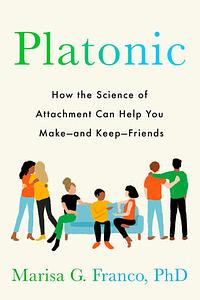Take a photo of a barcode or cover
808 reviews for:
Platonic: How the Science of Attachment Can Help You Make and Keep Friends as an Adult
Marisa G. Franco
808 reviews for:
Platonic: How the Science of Attachment Can Help You Make and Keep Friends as an Adult
Marisa G. Franco
informative
inspiring
lighthearted
reflective
medium-paced
challenging
emotional
informative
inspiring
medium-paced
emotional
informative
medium-paced
challenging
hopeful
informative
inspiring
medium-paced
informative
inspiring
reflective
medium-paced
hopeful
informative
inspiring
reflective
medium-paced
challenging
informative
inspiring
reflective
medium-paced
Friendship is hard. I know this personally, and it’s a phenomenon we’ve all been experiencing (or at the very least, witnessing) amid systemic cultural changes in the last decade, resulting in our current loneliness epidemic. Books are not the answer to our friendship woes, but they may help, and in this one psychologist and Psychology Today columnist Marisa G. Franco provides insight and assistance for the challenges plaguing our friendships.
Franco begins with an overview of friendship, including why it is important and how friendship is different today than in the past. Using the language of Attachment Theory, she helps readers diagnose our unique approaches to friendship (Secure, Anxious, or—my type—Avoidant). She then expands upon several key practices for making and keeping friends: Taking Initiative, Expressing Vulnerability, Pursuing Authenticity, Harmonizing with Anger, Offering Generosity, and Giving Affection. Franco uses her own friendship stories and those of others to illustrate these practices in action.
This book came highly recommended from a church friend who found it personally transformative. While I recognize the value of this book and appreciate many of its points, it was not the “game changer” that I anticipated. The book skews young, with most of the examples and advice geared towards unmarried, non-parent individuals in their twenties. A lot of the advice is either common sense or a little ridiculous (there’s quite a bit of woke language and psychobabble), and there is a frustrating selfish (excessively secular) tone that emphasizes feel-good friendship over sacrifice or altruism.
I liked the idea of applying Attachment Theory to friendship, and for me this was the most beneficial part of the book. There are also some helpful tidbits in the chapters on taking initiative and expressing vulnerability that I’ll be implementing in my friendships. If you find yourself trying and striking out in the friendship department, you may find some useful tools here, but don’t go in expecting a great solution to all of your relational woes.
My Rating: 3 Stars // Book Format: Audiobook (Followed along in Kindle)
Franco begins with an overview of friendship, including why it is important and how friendship is different today than in the past. Using the language of Attachment Theory, she helps readers diagnose our unique approaches to friendship (Secure, Anxious, or—my type—Avoidant). She then expands upon several key practices for making and keeping friends: Taking Initiative, Expressing Vulnerability, Pursuing Authenticity, Harmonizing with Anger, Offering Generosity, and Giving Affection. Franco uses her own friendship stories and those of others to illustrate these practices in action.
This book came highly recommended from a church friend who found it personally transformative. While I recognize the value of this book and appreciate many of its points, it was not the “game changer” that I anticipated. The book skews young, with most of the examples and advice geared towards unmarried, non-parent individuals in their twenties. A lot of the advice is either common sense or a little ridiculous (there’s quite a bit of woke language and psychobabble), and there is a frustrating selfish (excessively secular) tone that emphasizes feel-good friendship over sacrifice or altruism.
I liked the idea of applying Attachment Theory to friendship, and for me this was the most beneficial part of the book. There are also some helpful tidbits in the chapters on taking initiative and expressing vulnerability that I’ll be implementing in my friendships. If you find yourself trying and striking out in the friendship department, you may find some useful tools here, but don’t go in expecting a great solution to all of your relational woes.
My Rating: 3 Stars // Book Format: Audiobook (Followed along in Kindle)
emotional
hopeful
informative
reflective
slow-paced








